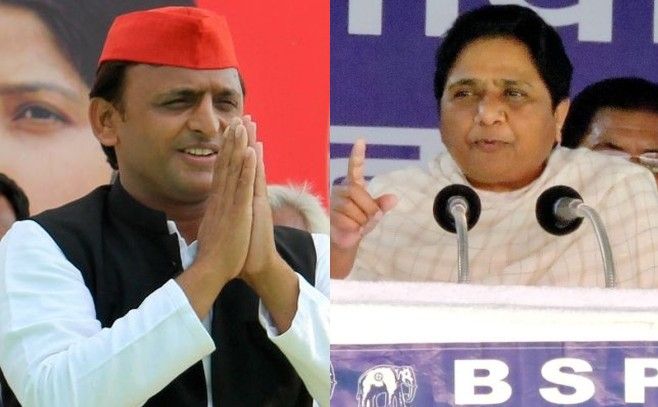The coming together of SP and BSP leaders on one platform is being seen as the emergence of a new phase of politics in the state after a dismal show of all anti-BJP parties in the 2014 Lok Sabha and 2017 assembly polls.

Arch rivals in Uttar Pradesh, the Samajwadi Party and the Bahujan Samaj Party will share a common platform at a rally organised by Lalu Prasad’s Rashtriya Janata Dal in Patna, heralding a new phase of politics in the country's cow belt.
SP chief Akhilesh Yadav and BSP president Mayawati have confirmed their participation in the Patna rally on August 27 for which the RJD supremo made a personal call to both of them recently, RJD state unit President Ashok Singh told PTI.
There are also efforts to get Samajwadi Party founder Mulayam Singh Yadav to attend the rally, Singh said.
The coming together of SP and BSP leaders on one platform is being seen in the political circles as emergence of a new phase of politics in the state after a dismal show of all anti-BJP parties in the 2014 Lok Sabha and 2017 assembly polls.
The RJD president has also invited leaders like Mamata Banerjee (Trinmool Congress), Naveen Patnaik (Biju Janata Dal) and Sharad Pawar (Nationalist Congress Party), and many of them are likely to attend, Singh said.
The Congress is likely to be represented by its president Sonia Gandhi, Singh said, adding that M K Stalin (of the Dravida Munnetra Kazhagam) has already confirmed his participation.
The effort is to repeat a Bihar-like experiment at the national level with all parties opposed to the BJP coming together, Singh said.
The coming together of sworn enemies SP and BSP in the politically crucial state of Uttar Pradesh could have a far-reaching effect to check the rise of the Bharatiya Janata Party, say political pundits.
The SP and the BSP together make a formidable alliance with consolidation of Dalit and backward votes, which could effectively checkmate BJP.
The BSP won only 19 seats in the 2017 election to the 403-member assembly, down from 80 in 2012. This is its lowest tally since 1991, when the party won 12 seats. The SP won 47, its lowest tally since the party’s inception in 1992.
The SP's lowest score so far was 97 seats in 2007.
While the SP’s vote share was 21.8 per cent, the BSP’s vote share was 22.2 per cent. BSP contested all the seats while SP left 105 seats for its ally, the Congress.
As the BJP’s unprecedented tally dwarfed the opposition, which has together been reduced to less than 75 seats, the call for an alliance between the SP and BSP started growing louder.
The BJP cornered 40 per cent of the votes polled, an increase of 25 per cent since last time, grabbing along with its National Democratic Alliance partners a whopping 325 seats.
Akhilesh Yadav has already confirmed his participation in the Patna rally.
"I will be present at Lalu Prasad’s Bihar rally on August 27. If there is any announcement (regarding a future alliance), it will me made there," he has said.
Though the BSP is yet to confirm Mayawati's participation in the event, its likelihood gained momentum when she attended a recent lunch hosted by Sonia Gandhi along with leaders of 16 other parties who have been traditionally hostile to each other.
Before the start of hostility between SP and BSP, the two parties had contested the 1993 UP Assembly elections in an alliance, with the BSP contesting 164 seats and winning 67, while the SP had contested 256 seats winning 109 in the then House of 425 (before the creation of Uttarakhand).
The government was formed with Mulayam Singh as the chief minister.
The relationship, however, turned sour and BSP withdrew support.
Mayawati went on to form a government with the help of the BJP in 1995.
Faced with the worst political scenario with even Mayawati not in a position to get re-elected to the Rajya Sabha when her present term expires in April next year, the
RJD president has already announced that he was ready to send her to the Upper House of Parliament to secure her political future.











 © 2025
© 2025